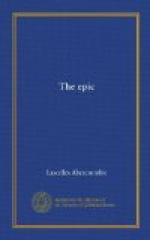So far, supposed differences between “authentic” and “literary” epic have resolved themselves into little more than signs of development in epic intention; the change has not been found to produce enough artistic difference between early and later epic to warrant anything like a division into two distinct species. The epic, whether “literary” or “authentic,” is a single form of art; but it is a form capable of adapting itself to the altering requirements of prevalent consciousness. In addition, however, to differences in general conception, there are certain mechanical differences which should be just noticed. The first epics were intended for recitation; the literary epic is meant to be read. It is more difficult to keep the attention of hearers than of readers. This in itself would be enough to rule out themes remote from common experience, supposing any such were to suggest themselves to the primitive epic poet. Perhaps, indeed, we should not be far wrong if we saw a chief reason for the pressure of surrounding tradition on the early epic in this very fact, that it is poetry meant for recitation. Traditional matter must be glorified, since it would be easier to listen to the re-creation of familiar stories than to quite new and unexpected things; the listeners, we must remember, needed poetry chiefly as the re-creation of tired hours. Traditional manner would be equally difficult to avoid; for it is a tradition that plainly embodies the requirements, fixed by experience, of recited poetry.




